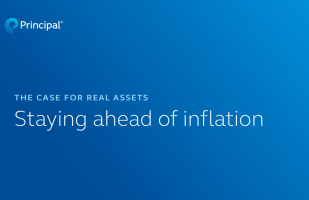
The case for private markets: three things to know
- STABILITY: PRIVATE MARKET PRICING HELPS AVOID PUBLIC MARKET NOISE
Inflation-linked private assets like real estate and farmland were one of the few refuges in the market upheaval of the last couple of years, and most private assets avoided the knee-jerk reactions of public markets. Private markets also provided stability during the Global Financial Crisis. Peak-to-trough, private credit experienced only 26% downside capture versus senior loans. The private equity and real estate downside capture versus public market equivalents were still beneficial at approximately 60%. More specifically, the S&P 500 was down -46% while private equity values declined only -27%, which with hindsight was more in line with the fundamentals of the period. Why the difference? Public markets tend to sell off more than fair value because they often rely on the wisdom of crowds and are subject to moments of panic. Private markets rely on the wisdom of experts to reflect economic conditions in their valuations.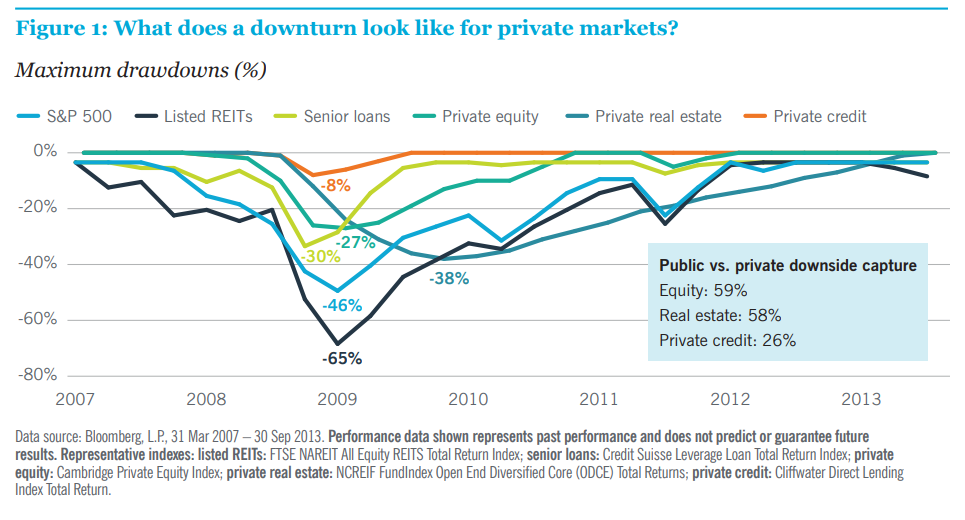
- RETURN AND INCOME POTENTIAL: CHARACTERISTICS OFFER OPPORTUNITY
Private markets are perhaps best known for their high return potential compared with similar public assets. Illiquid holdings have often been viewed as a limitation, but that same illiquidity also creates opportunities. Their advantage is grounded in sound fundamental economic logic. The investment time horizon is generally longer for private markets. In public companies, 87% of executives view their time horizon as under two years. Many opportunities, including M&A activity and turnarounds, take considerably longer to execute.1 Majority or complete ownership in private companies allows interests to be better aligned because management is held more accountable. Similarly, private transactions generally offer far greater transparency to the buyer than what is available to public market investors.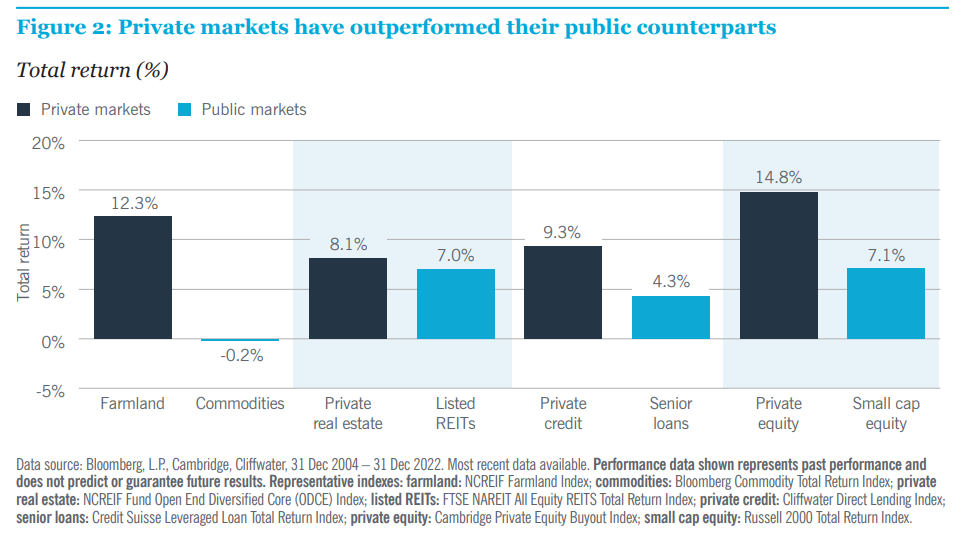
A wider opportunity set is another important factor boosting performance. There are more than 10 times the number of private companies as public ones,2 and public REITs account for only 9.4% of the approximately $20 trillion commercial real estate market.3 Illiqudity has historically been a barrier to entry, with even large private market investors investing only a portion of assets in private markets. Investors therefore face less competition and can negotiate lower equity valuations and higher bond yields. A well understood investing relationship says, other things being equal, buying assets with lower valuations/higher yields should lead to higher returns.
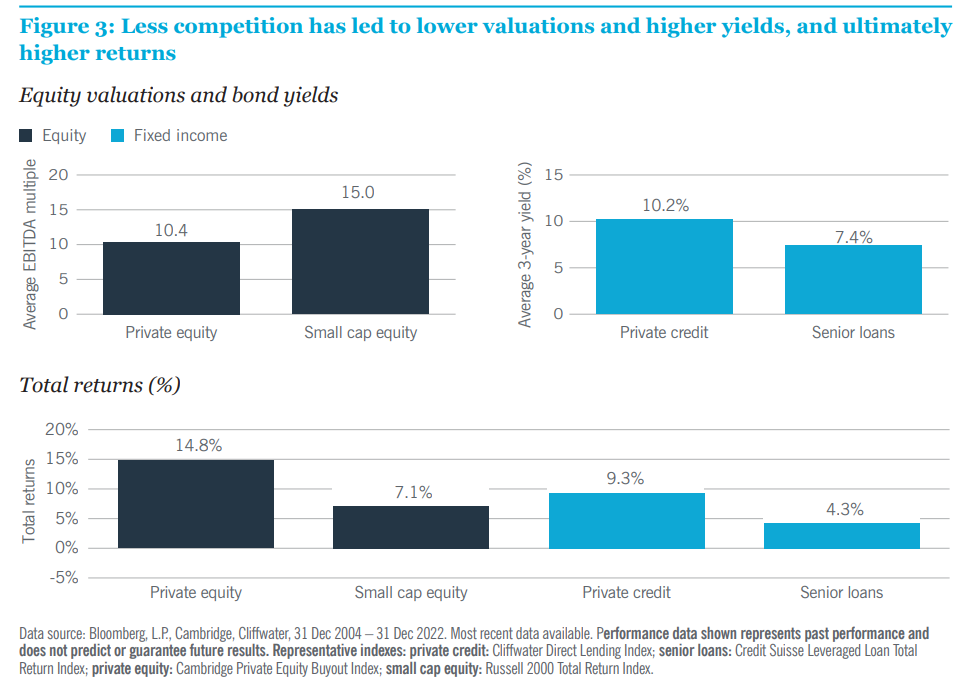
We expect the industry to continue shifting toward private capital and away from traditional financing sources such as banks and equity markets. Nonbank lenders now account for nearly 80% of loan origination versus less than 30% in 1994. At the same time, companies are staying private longer (12 years for IPOs in 2020 versus only 4 years in 19994) and going public at higher valuations (median value of $4.3 billion in 2020 versus $0.5 billion in 19994). The growth previously seen in public markets is now happening in private markets.
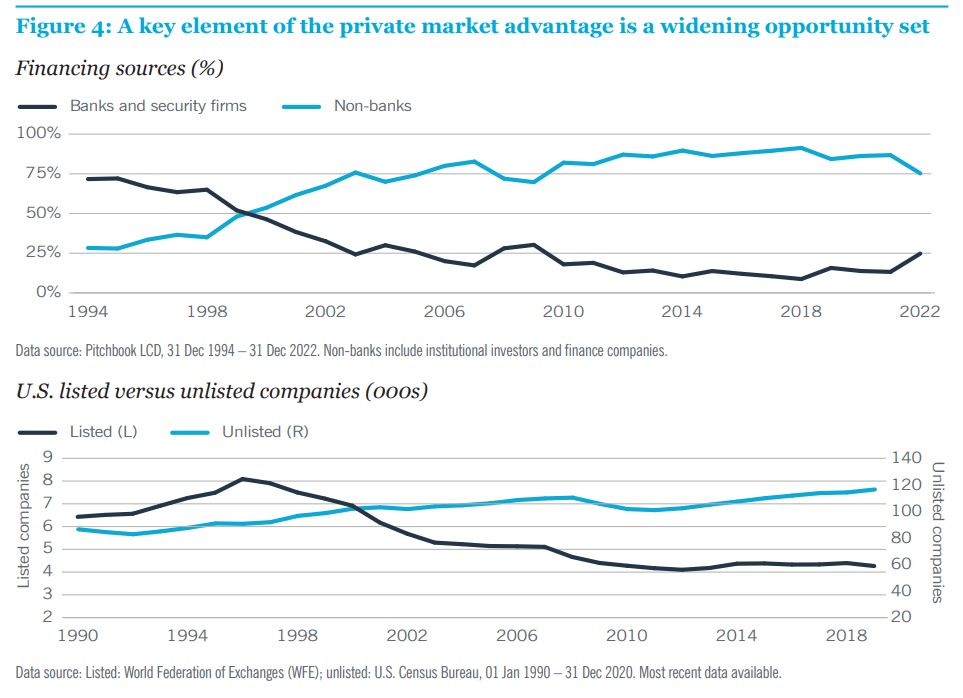
-
RESILIENCE: CASH FLOWS CAN INCREASE ALONG WITH INFLATION
Recessions and bouts of unexpected inflation are two of the key downside risks many investors think of when investing. Assets that have provided durable returns across both environments may be attractive portfolio diversifiers. For example, private real estate and farmland provide cash flows that increase with inflation. At the same time, shelter and food are defensive businesses that serve basic needs that consumers prioritize in periods of economic contraction. Conversely, assets such as long Treasuries and commodities are volatile and tend to perform only in recessionary or inflationary periods, but not both. And neither one has offered compelling long-term returns. Granted, there is no perfect solution. Guarding against inflation and recession requires accepting at least one trade-off among illiquidity, high volatility and lower returns. We believe, other things equal, that illiquidity is an advantageous trade-off, as investors typically have unused capacity for illiquid investments.

Enhancing portfolios with private investments
Allocating to private markets can be challenging and may not be appropriate in every case. Private strategies may have unfamiliar features and terms and management logistics. However, we believe that the role of private investments in a diversified portfolio is more important today than ever. As the name suggests, private markets can only be accessed through deeply established relationships, requiring clients to partner with experienced asset managers that can navigate this market effectively.
For more information, please visit nuveen.com. Endnotes Sources 1 Data source: McKinsey & Company, Measuring the Economic Impact of Short-Termism, February 20174 2 Data source: listed: World Federation of Exchanges (WFE); unlisted: U.S. Census Bureau. 3 Estimating the size of the Commercial Real Estate Market in the U.S., NARIET, 30 Jun 2022. Most recent data available. 4 Data source: Boston Consulting Group and iCapital, The Future is Private, March 2022. This material is not intended to be a recommendation or investment advice, does not constitute a solicitation to buy, sell or hold a security or an investment strategy, and is not provided in a fiduciary capacity. The information provided does not take into account the specific objectives or circumstances of any particular investor, or suggest any specific course of action. Investment decisions should be made based on an investor’s objectives and circumstances and in consultation with his or her financial professionals. The views and opinions expressed are for informational and educational purposes only as of the date of production/writing and may change without notice at any time based on numerous factors, such as market or other conditions, legal and regulatory developments, additional risks and uncertainties and may not come to pass. This material may contain “forward-looking” information that is not purely historical in nature. Such information may include, among other things, projections, forecasts, estimates of market returns, and proposed or expected portfolio composition. Any changes to assumptions that may have been made in preparing this material could have a material impact on the information presented herein by way of example. Performance data shown represents past performance and does not predict or guarantee future results. Investing involves risk; principal loss is possible. All information has been obtained from sources believed to be reliable, but its accuracy is not guaranteed. There is no representation or warranty as to the current accuracy, reliability or completeness of, nor liability for, decisions based on such information and it should not be relied on as such. For term definitions and index descriptions, please access the glossary on nuveen.com. Please note, it is not possible to invest directly in an index. Important information on risk Investors should be aware that alternative investments are speculative, subject to substantial risks including the risks associated with limited liquidity, the use of leverage, short sales and concentrated investments and may involve complex tax structures and investment strategies. Alternative investments may be illiquid, there may be no liquid secondary market or ready purchasers for such securities, they may not be required to provide periodic pricing or valuation information to investors, there may be delays in distributing tax information to investors, they are not subject to the same regulatory requirements as other types of pooled investment vehicles, and they may be subject to high fees and expenses, which will reduce profits. Alternative investments are not suitable for all investors and should not constitute an entire investment program. Investors may lose all or substantially all of the capital invested. Nuveen provides investment advisory solutions through its investment specialists. This information does not constitute investment research as defined under MiFID. Enhancing portfolios with private investments Allocating to private markets can be challenging and may not be appropriate in every case. Private strategies may have unfamiliar features and terms and management logistics. However, we believe that the role of private investments in a diversified portfolio is more important today than ever. As the name suggests, private markets can only be accessed through deeply established relationships, requiring clients to partner with experienced asset managers that can navigate this market effectively. NOT FDIC INSURED | NO BANK GUARANTEE | MAY LOSE VALUE

